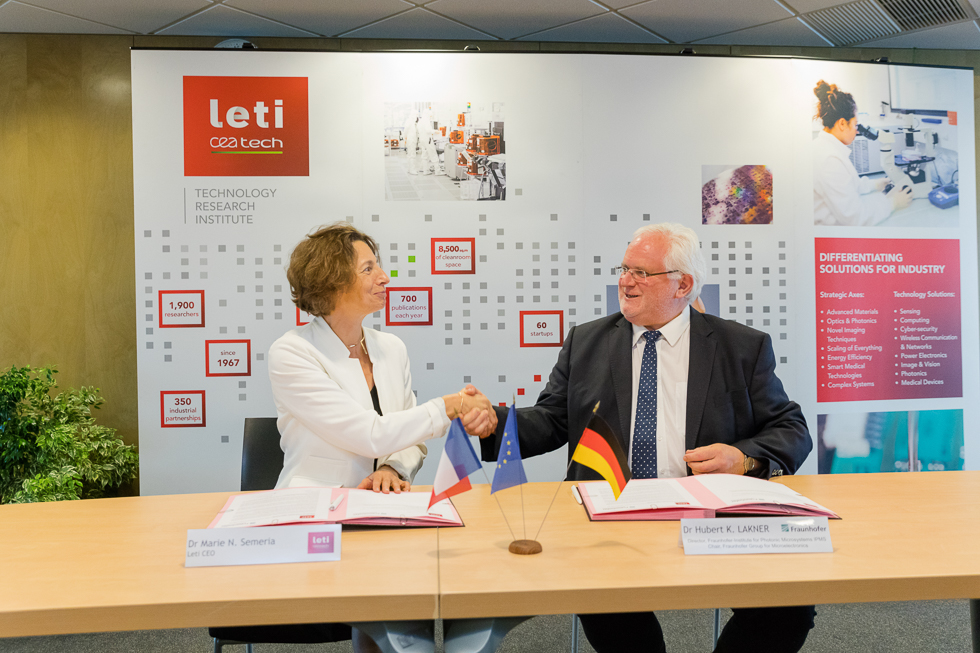Leti and Fraunhofer team up to strengthen microelectronics innovation in France and Germany
First Focus Will Be on Extending CMOS and More-than-Moore Technologies for Next-generation Electronic Components; New Technologies Will Be Available to Companies Across Europe
GRENOBLE, France – June 28, 2017 – Two leading European research institutes today announced their new collaboration to develop innovative, next-generation microelectronics technologies to spur innovation in their countries and strengthen European strategic and economic sovereignty.

Leti, a research institute of CEA Tech in Grenoble, France, and the Berlin-based Fraunhofer Group for Microelectronics, Europe’s largest R&D provider of smart systems, will initially focus on extending CMOS and More-than-Moore technologies to enable next-generation components for applications in the Internet of Things, augmented reality, automotive, health, aeronautics and other sectors, as well as systems to support French and German industries.
The agreement was signed today by Leti CEO Marie Semaria and Fraunhofer Group for Microelectronics Chairman Hubert Lakner during Leti Innovation Days, which are marking Leti’s 50th anniversary.
“The ability to, one, develop key enabling technologies that overcome the formidable technical challenges that our leading technology companies will face, and, two, transfer them quickly to industry, is an essential focus for research institutes and industrials in France and Germany,” Semaria said. “Building on our previous, successful collaborations, Leti and the Fraunhofer Group for Microelectronics will bring our complementary strengths to the task of keeping France and Germany’s microelectronics industries in the forefront – and offer our innovations across Europe.”
“Micro-/nanoelectronics and smart systems are key enabling technologies for the economic success of Europe, especially in France and Germany. Thus, Europe can no longer afford to scatter its research competences. For the benefit of industry, joining forces will become more and more important, not only for industry but also for RTOs,” Lakner explained. “The new cooperation agreement will be the starting point for a strategic research cooperation of the two countries in order to jointly support the upcoming EC initiative, Important Project of Common European Interest (IPCEI), on micro- and nanoelectronics.”
Specific R&D projects that the collaboration will focus on include:
- Silicon-based technologies for next-generation CMOS processes and products, including design, simulation, unit process and material development as well as production techniques
- Extended More than Moore technologies for sensing and communication applications
- Advanced-packaging technologies.
The second phase of the collaboration may be expanded with additional academic partners and other countries, as needed.
About Leti (France)
Leti, a technology research institute at CEA Tech, is a global leader in miniaturization technologies enabling smart, energy-efficient and secure solutions for industry. Founded in 1967, Leti pioneers micro-& nanotechnologies, tailoring differentiating applicative solutions for global companies, SMEs and startups. Leti tackles critical challenges in healthcare, energy and digital migration. From sensors to data processing and computing solutions, Leti’s multidisciplinary teams deliver solid expertise, leveraging world-class pre-industrialization facilities. With a staff of more than 1,900, a portfolio of 2,700 patents, 91,500 sq. ft. of cleanroom space and a clear IP policy, the institute is based in Grenoble, France, and has offices in Silicon Valley and Tokyo. Leti has launched 60 startups and is a member of the Carnot Institutes network. This year, the institute celebrates its 50th anniversary.
Follow us on www.leti-cea.com and @CEA_Leti.
CEA Tech is the technology research branch of the French Alternative Energies and Atomic Energy Commission (CEA), a key player in innovative R&D, defence & security, nuclear energy, technological research for industry and fundamental science, identified by Thomson Reuters as the second most innovative research organization in the world. CEA Tech leverages a unique innovation-driven culture and unrivalled expertise to develop and disseminate new technologies for industry, helping to create high-end products and provide a competitive edge.
About Fraunhofer (Germany)
The Fraunhofer-Gesellschaft, founded in 1949, is the leading organization for applied research in Europe. Its research activities are conducted by 69 institutes and research units at locations throughout Germany. The Fraunhofer-Gesellschaft employs a staff of 24,500, who work with an annual research budget totaling 2.1 billion euros. Of this sum, 1.9 billion euros is generated through contract research. More than 70 percent of the Fraunhofer-Gesellschaft’s contract research revenue derives from contracts with industry and from publicly financed research projects. International collaborations with excellent research partners and innovative companies around the world ensure direct access to regions of the greatest importance to present and future scientific progress and economic development.
The Fraunhofer Group for Microelectronics, founded in 1996, is a service provider for R&D in the areas of microelectronics and smart systems integration. It combines the expertise of 11 Fraunhofer Institutes (plus seven associated institutes from other domains) with a total of more than 3,000 employees, 9 cleanroom facilities for 200mm and 300mm wafer technologies, and a yearly budget of about 400 million euros. The Fraunhofer Group for Microelectronics stands for a unique range of expertise, not found elsewhere in the world, from fundamental research to product development, particularly in micro- and nanoelectronics, as well as microsystem and communication technologies.
Last modified: